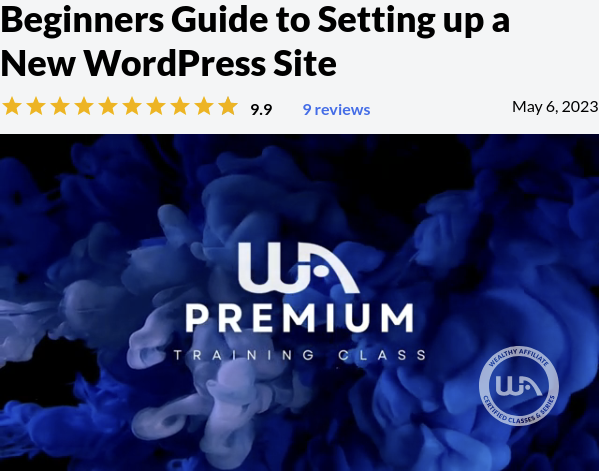Launching your own business is thrilling yet intimidating, but today’s digital landscape puts everything you need within reach. By uniting a WordPress website with Wealthy Affiliate’s step-by-step coaching, you create a sturdy platform for securing your place in the digital marketplace. In this article, I’ll show how harnessing these two formidable resources can catapult you from absolute beginner to confident, thriving e-commerce entrepreneur.
With its intuitive dashboard and extensive library of themes and plugins, WordPress is the platform of choice for entrepreneurs eager to establish an online presence. Yet the real hurdle isn’t building the site—it’s mastering the intricacies of SEO, digital marketing, and content creation. That’s where Wealthy Affiliate steps in, acting as a seasoned mentor that breaks down each step and fast-tracks your path to success.
Whether you’re marketing handmade products, offering expert advice, or anything in between, this all-inclusive roadmap will give you the know-how and confidence to launch your online venture. With Wealthy Affiliate’s step-by-step training, you can transform your idea into a thriving digital storefront, reach customers around the globe, and convert passion into profit. Buckle up—WordPress and Wealthy Affiliate are ready to ride shotgun as you make your entrepreneurial leap.
Here’s how to get started on your journey of starting your own business online:
Choose Your Niche and Products
Before diving into the technical aspects of starting a business online, it’s crucial to decide what you’ll sell. Start with your interests and passions – after all, starting up your own business should be something you’re passionate about. Use tools like Google Trends and Keyword Planner to research viable markets and niches. Also, consider analyzing your competition to learn about successful products and marketing techniques.
Select a Web Hosting Service
When launching a website, selecting a top-notch web hosting service is not just crucial—it’s a game-changer. Although hosts such as Bluehost, SiteGround, and Liquid Web offer plans to suit a variety of needs, Wealthy Affiliate sets itself apart by bundling WordPress-optimized hosting directly into its Premium membership—purpose-built to unlock the platform’s full power at no extra cost.
For entrepreneurs who are serious about establishing an online presence, Wealthy Affiliate’s hosting platform offers a seamless and advantageous experience. It’s engineered specifically for WordPress, ensuring that your site runs smoothly, loads quickly, and remains secure against online threats. Unlike other hosting options that may require additional costs, this service is integrated into your Premium membership with Wealthy Affiliate, streamlining your path to a successful online business.
With Wealthy Affiliate’s hosting, you can rest easy knowing you’re getting a service that’s optimized for WordPress and rivals the best in the industry. This offering eliminates the hassle of comparing various hosting plans and providers, as it’s designed to meet the demands of your growing business. By choosing Wealthy Affiliate, you’re not just choosing superior hosting—you’re also gaining access to a community of experts and resources dedicated to your success.
Set Up Your Domain Name
Your domain name is your online identity – it’s how people will find and remember your business. When starting up your own business online, it’s important to choose a name that reflects your brand and is easy to remember. Some hosting plans even offer a free domain for the first year, making it even easier to start your business website.
Choose a WordPress Theme
Your theme determines the look and feel of your website – it’s what sets you apart from the competition. There are many e-commerce-friendly themes available, such as Neve, Storefront, OceanWP, and Astra. When starting your own business online, it’s essential to choose a theme optimized for e-commerce to attract customers and drive sales.
Set Up WooCommerce
WooCommerce is a popular and highly customizable e-commerce platform for WordPress. It’s free to use and can be set up with the WooCommerce Setup Wizard, making it easier for you to start your own business online. WooCommerce also offers features like WooPayments for accepting payments, making it easier for you to start up your business website.
Extend Functionality with Plugins
To elevate your online storefront to new heights, integrating the right plugins into your WordPress site is key. Among these, Yoast stands out as a premier SEO plugin, essential for ensuring your business gets noticed on the web. Alongside Yoast, other indispensable plugins specifically designed to enhance your e-commerce capabilities include Booster for WooCommerce, WooCommerce Side Cart, and PPOM Pro.
Yoast SEO is a powerhouse, offering comprehensive tools to optimize your site’s content for search engines, ultimately driving more traffic to your store. Meanwhile, Booster for WooCommerce equips you with a suite of features to supercharge your store, from pricing adjustments to invoicing. The WooCommerce Side Cart adds convenience, allowing customers to easily access their cart without navigating away from the current page, and PPOM Pro personalizes the shopping experience with additional options for your products.
Each of these plugins contributes to a robust e-commerce ecosystem on your WordPress site, simplifying payment processes, improving image loading times, and offering multilingual support for a global customer base. By harnessing the combined power of Yoast and these carefully selected e-commerce plugins, you’re setting up your online business for success, ensuring a smooth, user-friendly shopping experience for your customers.
Add Products and Create Pages
Once you’ve set up your website, it’s time to start adding products and creating pages. Create detailed product pages with high-quality images and descriptions to attract customers and drive sales. Also, set up essential pages like Home, About Us, Contact Us, and Product pages to provide visitors with all the information they need to start up their own business online.
Optimize Your Online Store
Optimizing your online store is essential for attracting customers and driving sales. Optimize your website for search engines and page speed to improve visibility and user experience. Consider using marketing tools like Google Ads and content marketing to drive traffic to your website and start up your own business online.
Secure Your Website
In the digital marketplace, the security of your e-commerce site is non-negotiable. For entrepreneurs taking their business online, it’s essential to maintain a secure and trustworthy environment for customers. That’s why Wealthy Affiliate offers SSL certificates as part of their Premium membership deals, ensuring that your site encrypts and protects sensitive data right from the start.
With Wealthy Affiliate, you can rest assured that your online business is fortified with an SSL certificate, an essential layer of security that safeguards customer information during transactions. This level of encryption is crucial for building customer trust and is standard practice for reputable online stores.
Moreover, WooCommerce, the e-commerce platform of choice for WordPress users, integrates robust encryption measures to further secure online transactions. When combined with the SSL certificate provided by Wealthy Affiliate, and with regular updates to your site and its plugins, you create a solid defense against potential threats.
By choosing Wealthy Affiliate’s Premium membership for your hosting needs, you’re not only getting a platform specially optimized for WordPress and WooCommerce, but you’re also ensuring that your e-commerce site meets the high-security standards required in today’s online business landscape.
Launch and Improve Your Store
After setting up your store, continue to improve it by refreshing the design, adding new features, and optimizing conversion rates. Remember, launching your store is only the beginning of your journey – starting up your own business online requires constant innovation and improvement to stay ahead of the competition.
Consider Additional Tools and Tips
There are many tools and tips available to enhance your WordPress e-commerce store and make it easier for you to start up your own business online. These include membership plugins, email marketing tools, inventory management solutions, and custom error page plugins – all of which can help you attract customers and drive sales.
Starting up your own business online is an exciting journey that requires careful planning and execution. By following these steps and utilizing the power of WordPress and WooCommerce, you can create a successful online store that meets your business needs. Remember to keep your website updated and secure, and always look for ways to improve your store’s functionality and customer experience.
With the help and training available at Wealthy Affiliate, you’ll be well on your way to launching a thriving online business and starting up your business website – all for free. So why wait? Start your journey of starting your own business online today!








